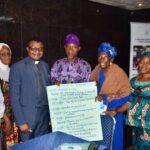STRATEGIC COMMUNICATION AND HEALTH WORKER EMPOWERMENT FOR SAFER CHOICES.
BY PRINCE BENSON DAVIES


In Lagos State, where daily life thrives in bustling markets, busy hospitals, and cozy homes, a gentle yet powerful transformation is underway. This movement aims to replace fear with understanding, stigma with kindness, and silence with clear, thoughtful conversations. It starts with the important realization that misinformation about abortion isn’t just a public health concern; it’s a matter of dignity, safety, and making truly informed choices.For too long, women in Lagos have been navigating a confusing maze of half-truths and unfounded assumptions. However, thanks to dedicated efforts such as capacity building and community-led advocacy, organizations like the Leadership Initiative for Youth Empowerment (LIFE) are now supporting health workers and policymakers in rewriting this story, fostering a more supportive and informed environment for everyone.The Ripple Effect of MisinformationAbortion remains one of the most misunderstood aspects of reproductive health in Nigeria. While the law permits termination of pregnancy when a woman’s life is at risk, many people believe it is entirely illegal. This misconception fuels fear, shame, and secrecy, driving women away from regulated healthcare and into the hands of unqualified providers.According to the World Health Organization, approximately 22,000 women die annually from unsafe abortions worldwide, with countless others suffering long-term complications (WHO, 2022). In Nigeria, the lack of clear public messaging and legal guidance exacerbates the crisis.“When women don’t know their rights, they don’t ask for help,” said Dr. Aisha Lawal, a reproductive health educator in Lagos. “And when they don’t ask, they suffer in silence.”More Than Just MessagingStrategic communication is not merely about disseminating facts; it’s about shaping perceptions, building trust, and fostering dialogue. LIFE’s approach includes:Community radio programs that explain abortion laws in local languages.Clinic posters that use inclusive language and visuals to reduce stigma.Social media campaigns that feature real stories from women and health workers.These efforts are designed to reach people where they are, whether in a waiting room, a WhatsApp group, or a church gathering.“We realized that shouting facts wasn’t enough,” said Ngozi, a volunteer with LIFE. “We had to listen first, then speak in ways that felt familiar and respectful.”The Frontline of CompassionHealth workers are often the first, and sometimes only, source of information for women seeking abortion-related care. Their attitudes can either open doors or reinforce barriers.Unfortunately, some providers still use judgmental language or delay treatment due to personal beliefs. This not only violates ethical standards but also puts lives at risk.“I’ve seen patients turned away for asking questions,” said Dr. Emeka, a physician in Ikeja. “That’s not care, that’s punishment.”But change is possible. LIFE’s training modules help health workers reflect on their biases, understand the legal framework, and practice trauma-informed communication. These sessions include role-play, peer feedback, and real-life case studies.“After the training, I realized how my tone could make or break a patient’s trust,” said Nurse Blessing, who works in a primary health centre in Mushin.A Tool for Clarity and ConfidenceOne of LIFE’s key advocacy goals is the reinstatement of the STOP Guideline, a policy framework that outlines when and how safe abortion care can be provided under Nigerian law. Originally developed to help health workers navigate legal and ethical complexities, the guideline offers clarity and protection.“The STOP Guideline gave us confidence to act responsibly,” said Hon. Fola Idris, a Lagos State policymaker. “Without it, many providers are left guessing, and that’s dangerous.”LIFE is working with legal experts and medical associations to update and reintroduce the guideline, ensuring it reflects current realities and supports both patients and providers.Capacity Building: Beyond Clinical SkillsCapacity building isn’t just about medical knowledge; it’s about emotional intelligence, legal literacy, and cultural sensitivity. LIFE’s workshops cover:Understanding abortion law and policyResponding to patients with empathyNavigating religious and cultural tensionsDocumenting care ethically and legallyThese sessions are tailored to different cadres of health workers, from community health officers to senior consultants.“We’re not just training hands, we’re training hearts,” said LIFE’s Program Officer, Toyin Olatunde.What’s Changing?LIFE’s strategic communication and capacity-building efforts are already showing results, with community awareness of abortion law improved by 40% in targeted districts, based on pre- and post-campaign surveys. These numbers reflect more than metrics; they represent lives saved, fears eased, and trust restored.A Collective ResponsibilityCombating false narratives about abortion and improving health worker attitudes requires a whole-of-society approach. LIFE is calling on:Government agencies to fund training and reinstate the STOP Guideline.Religious leaders to promote compassion and understanding.Media outlets to report responsibly and avoid sensationalism.Civil society organizations to amplify women’s voices and experiences.“This isn’t just a health issue, it’s a human rights issue,” said an intern at LIFE. “Every woman deserves accurate information and respectful care.”Building a Brighter FutureIn Lagos, the winds of change are blowing gently but steadily. Through strategic communication and capacity building, the city is beginning to reimagine what abortion care can look like, safe, legal, compassionate, and informed.This transformation won’t happen overnight. But with every training session, every community dialogue, and every supportive word from a health worker, the narrative shifts.Let’s build a future where women are met with kindness, not judgment. Where health workers are empowered, not confused. And where reproductive health is treated not as a taboo, but as a cornerstone of dignity and care.
 The New Experience Newspapers Online News Indepth, Analysis and More
The New Experience Newspapers Online News Indepth, Analysis and More
